Scottish independence: Where might Trident go?
- Published
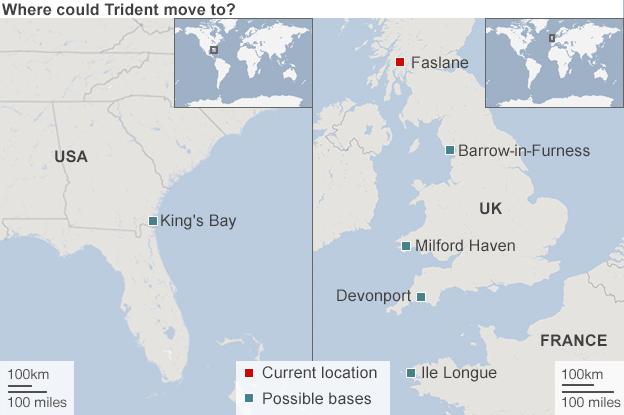
Scottish ministers say the UK's nuclear deterrent - the submarine-based Trident - will be banished from Scotland if it becomes independent. The UK government says there are no plans to move it. But where could it relocate to if it had to?
The UK's nuclear weapons system - currently made up of four Vanguard-class submarines which carry Trident strategic missiles - has been based at HM Naval Base Clyde on Scotland's west coast since the 1960s.
The site is made up of two main parts - Faslane on the Gareloch, where the submarines are based, and Coulport on Loch Long, eight miles away, where the warheads are stored. The sites are kept separate for safety reasons.
The UK has had at least one submarine on patrol at any given time for more than 40 years and has used the Trident system since the 1990s.
Both Conservatives and Labour want a like-for-like replacement when the existing fleet ends its working life in the late 2020s, while the Liberal Democrats want to downsize to three submarines, saying the existing system was designed for the Cold War era.
The UK government says all Royal Navy submarines will be based at Faslane by 2017 - supporting 8,000 jobs - and there are are no plans to move the nuclear deterrent. Defence Secretary Philip Hammond has said any alternative solution would come at huge cost and take decades.
In 2012, an inquiry into independence by a cross-party group of MPs, external concluded that identifying and recreating a suitable base to replace Faslane and Coulport would be "highly problematic, very expensive, and fraught with political difficulties".
However, the Scottish government says if Scotland votes "Yes" in the independence referendum on 18 September, Trident will be removed - with the weapons' withdrawal by 2020 - and a written constitution would ban nuclear weapons from being based in Scotland.
It also says Faslane has a "strong future" as a conventional naval base and the joint HQ for defence forces of an independent Scotland, and military personnel employed there would match current numbers.
So if the UK had to relocate Trident, where might it go?
1. Milford Haven
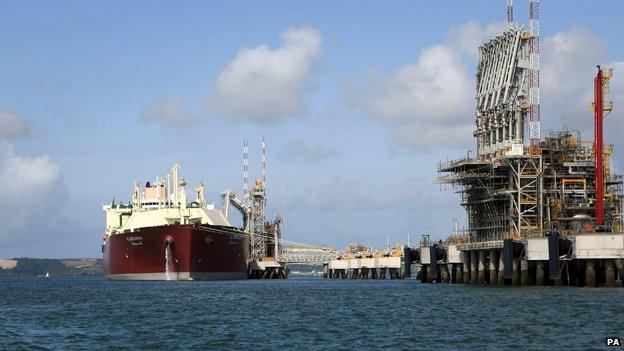
Milford Haven is home to two liquefied natural gas facilities
In 2012 Wales's Labour First Minister Carwyn Jones said the UK's nuclear-armed submarines and jobs associated with it would be "more than welcome" in Wales if they left Scotland. The remark that was met with an angry response from Plaid Cymru politicians and activists who cited safety risks.
When the original shortlist was drawn up for basing Trident's predecessor Polaris in the 1960s, Milford Haven in Pembrokeshire was one of the candidates.
The Welsh site is an attractive option because it is a natural deep-water port. But In the 1960s Esso had just established an oil refinery in the town and the MoD decided the two were incompatible on safety grounds, according to William Walker, one of the authors of Uncharted Waters: The UK Nuclear Weapons and the Scottish Question.
"The dangers of handling and storing high explosives near major oil facilities ruled it out. Imagine a big submarine colliding with a tanker. It's common sense - even if there is a low probability, the consequences could be horrific," he says.
Nowadays the town's economic and industrial output makes that line of thinking even more tricky. The haven is home to two liquefied natural gas (LNG) facilities and handles 30% of the UK's gas supply. It also hosts two oil refineries and will soon have a new power station.
Dr Nick Ritchie, a lecturer in international security at the University of York, says it's inconceivable that the MoD would allow LNG plants and oil refineries to stay open if Trident was relocated to Milford Haven.
And he says closing the refineries and petrochemical plants would have "a pretty significant economic impact".
Walker thinks there would also be a question over whether the port could take the submarine traffic. There is also the possibility Wales might follow in Scotland's footsteps and call for further devolution or independence. If it voted for that, and took the same stance as Scotland, the MoD would be back to square one.
2. Plymouth
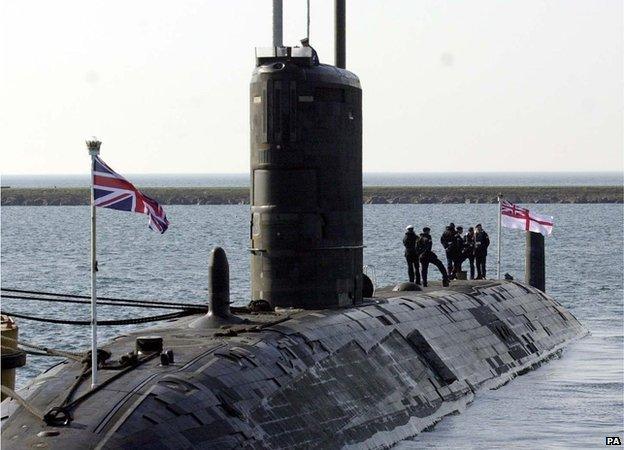
Trafalgar-class submarine HMS Turbulent at Devonport
Devonport Dockyard in Plymouth - the biggest private-sector employer in Devon and Cornwall - is the main nuclear repair and refuelling facility for the Royal Navy.
It is also home to the Trafalgar-class submarines, which will be moved to Faslane by 2017.
The port's size - the largest naval base in Western Europe covers more than 650 acres and has 15 dry docks, 25 tidal berths and five basins - and familiarity with submarines has led some to believe Devonport might be the best option for an alternative location for Trident.
However, the Royal United Services Institute's Malcolm Chalmers says even though - time and expense allowing - Devonport might work as an alternative to Faslane, it couldn't recreate Coulport.
Coulport possesses a huge floating dock where warheads are placed inside the missiles, 3km from the small village of Garelochhead on one side and the small village of Ardentinny on the other, Westminster's Scottish Affairs Committee heard in 2012, external. Any new warhead storage facility would need similar distances from population centres for loading and offloading warheads from missiles.
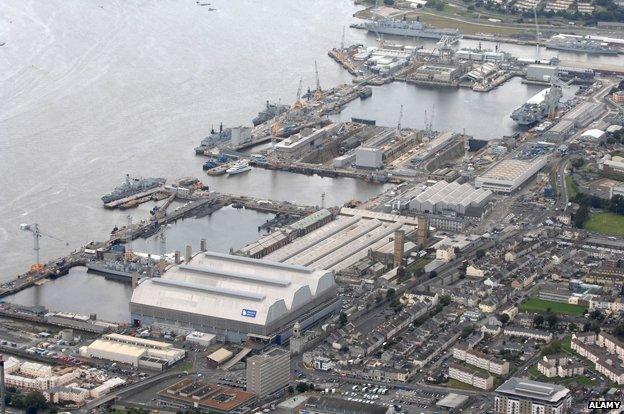
The dockyard is also in a densely populated area, which poses a safety risk. There are about 166,000 people living within 5km of the Devonport base, compared with about 5,200 within that distance of Faslane and fewer close to Coulport. The city of Plymouth has about 250,000 residents and is within 3.5km of the dockyard. Glasgow has a population of about 600,000, but it is 25km away from Faslane.
Walker says loading warheads into the missiles on Trident is "very delicate and complicated" and a process that shouldn't be done in or near built-up areas.
"You can't have Trident missile bodies laden with rocket fuel and nuclear warheads near a city of quarter a million people - the UK regulatory authorities would be very uncomfortable with that," says Ritchie.
Lifting missiles is also a safety risk. "There needs to be an explosive handling jetty that is designed for the worst case scenario - if a missile is dropped or there is an earthquake, even if this might only happen once in several thousand years, and high explosives are scattered," says Chalmers.

Trident facts and figures
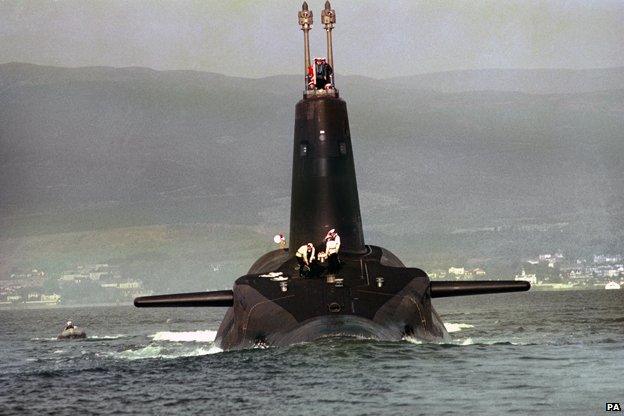
UK has four Vanguard Class submarines: HMS Vanguard, HMS Victorious, HMS Vigilant, and HMS Vengeance
They were launched between 1992 and 1998
Vanguard-class vessels are 150m (492ft) long
Ministry of Defence estimates cost of replacing all four submarines at £20bn
Submarines are based at Faslane on Gareloch
Missiles are kept at Coulport on Loch Long
UK has access to 70 Trident missiles held in communal pool at strategic weapons facility in Georgia, USA
Trident missile system replaced the Polaris system

In 1963, Falmouth was suggested as a warhead depot option - like Coulport - in combination with Devonport. However the MoD dismissed the idea because it wanted the ammunitions depot to be within one hour's sailing of the submarine base. Falmouth is 70km west of Devonport. However Chalmers thinks this combination could be a runner. "But it would require substantial political will," he says.
Falmouth was also seriously considered in its own right in the 1963 shortlist. However, the area has a strong tourist economy and the proposed site would have required National Trust land acquisition which would be very difficult, if not impossible.
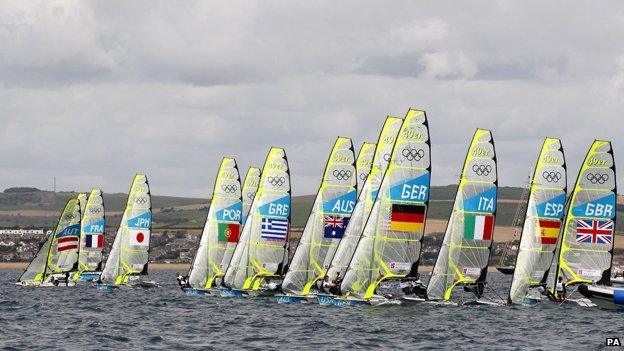
Weymouth hosted the sailing events in the 2012 Olympics
Portland, Weymouth, was the third English port to make the shortlist. It was ruled out because it didn't have a close enough site for the warheads depot. Chalmers says it was the issue of warhead loading being kept far enough away from people and sites of economic value that meant Scottish locations made six of the 10 shortlisted 1960s options.
Portland's naval base and the neighbouring Naval Air Station have now been closed down and replaced by a residential and commercial marina which hosted the sailing events in the 2012 Olympics.
3. Barrow-in-Furness
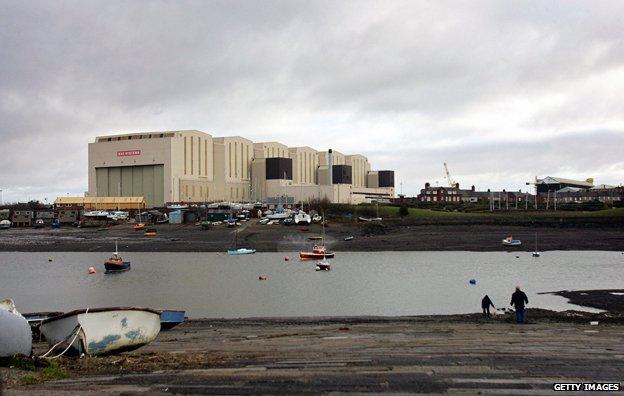
The Vanguard submarines were built in Barrow-in-Furness
An existing nuclear site that could be considered is Barrow-in-Furness in Cumbria, where BAE are currently building the nuclear-powered Astute-class submarines.
However, the base didn't make it on to the 1963 shortlist because Walney Channel is thought to be too shallow for nuclear submarines.
Part of the problem is tidal. There are only a certain number of hours in each month when the tide is high enough for nuclear submarines to transit into the open sea, a 2005 investigation by research group RAND, external found.
Even at these restricted times the vessel has to travel fast to complete the journey.

Trident II D5 missiles
Length: 44ft (13m)
Weight: 130,000lb (58,500kg)
Diameter: 6ft 11in (2.11m)
Range: 7,500 miles (12,000km)

The problem isn't just theoretical. The second Polaris submarine to be built at Barrow, HMS Repulse, ran aground when it was launched in November 1967.
However, Francis Tusa, editor of Defence Analysis, told the 2012 inquiry by a cross-party committee of MPs, external that Barrow's advantage was that it already had support facilities, including a ship-lift, similar to Faslane.
Substantial dredging would also make the site more accessible.
There are other problems though. The size of the current dock means it would not have room for more than two Vanguard-class submarines and the town - which has a population of about 69,000 - is close by. There is also the issue of where the warhead depot would be.
As with most of the options, Barrow could work but it would be costly and require extensive changes. "The bottom line with all these potential sites is we are talking about huge infrastructure projects like high-speed rail or Heathrow. It's only when the detail is looked at that it becomes clear how complicated it is, and nobody has done the very detailed feasibility [studies] that would be needed," says Chalmers.
4. Ile Longue, Brittany, France
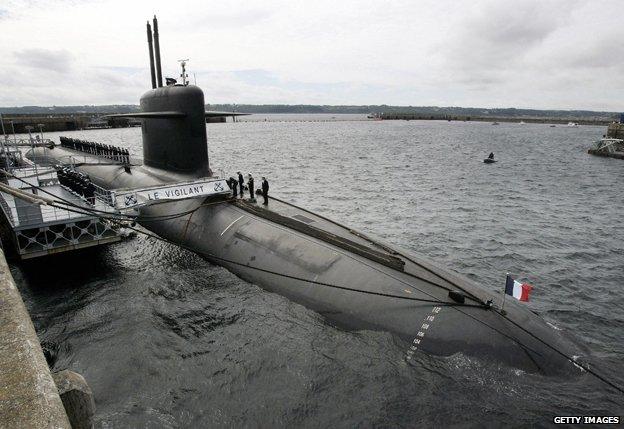
Ile Longue base, north-west France
The idea of the UK's nuclear deterrent being based abroad would horrify some in the British military and raise big questions about its independence.
No country has ever kept their deterrent force in its entirety in a foreign country, based on the principle that a country's last resort has to be somewhere where it has total control of it.
However, the UK and France have recently signed up to two new defence agreements.
One of these is for a joint nuclear weapons research establishment - where the two countries will share the hydrodynamic test facilities but keep the data from their experiments separate - at Epure.
And there have been calls for the UK to consider patrols with France, following the collision between Le Triomphant and HMS Vanguard in February 2009.

It might be possible to expand Anglo-French nuclear cooperation by asking France to host the British nuclear fleet. "I would say that's the best option from economic and ease point of view," says Dr Michael John Williams, a reader in international relations at Royal Holloway, University of London.
Tusa told the Scottish Affairs Committee, external there was also a precedent for storing warheads abroad.
"We shared American storage facilities for nuclear warheads at Iserlohn for 40 years and no-one seemed to care. There were American, German and British guards. The UK had British bunkers on German soil, but it was a US sovereign base. I did not notice anyone caring one way or the other," he said.
However, Ritchie says a separate nuclear submarine base and nuclear armaments depot would have to be built in France because of commitments to the UK's nuclear safety regulatory authorities and Nato.
That would be a problem at Ile Longue - where France's fleet of nuclear-armed submarines are based - because it doesn't have space, according to John Ainslie, co-ordinator at the Scottish Campaign for Nuclear Disarmament, which wants to get rid of Trident altogether.
It also shouldn't be assumed that the French would be prepared to have a sovereign foreign nuclear weapons base on their territory, says Ron Smith, professor of Applied Economics at Birkbeck College, University of London.
5. King's Bay, Georgia, US
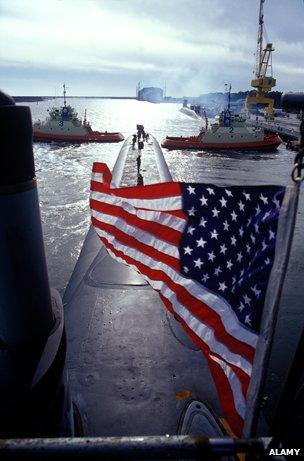
The equally radical idea of re-siting to the US raises similar questions over independence as France.
However, Trident is a joint venture between the UK and the US. Trident II D5 missiles are leased from the US in King's Bay, Georgia.
British submarines return to Georgia for their maintenance on a regular basis and the UK contributes £12m a year to the US as part of the running costs of the base. Non-nuclear warhead components are also made in the US.
Past UK prime ministers have always stressed Trident's independence, saying its firing does not require the permission, the satellites or the codes of the US.
But Ritchie says there has always been a degree of controversy over the "incredibly high level of US support that allows the UK to remain a nuclear weapons base".
Despite the "special relationship" between the US and the UK, as with the France option, there would be massive political obstacles to be overcome.
Essentially it comes back to independence. "Even when countries get on well, they can disagree. For the UK to have its ultimate security guaranteed, it would want to be fully independent," says Williams.
6. It could stay put
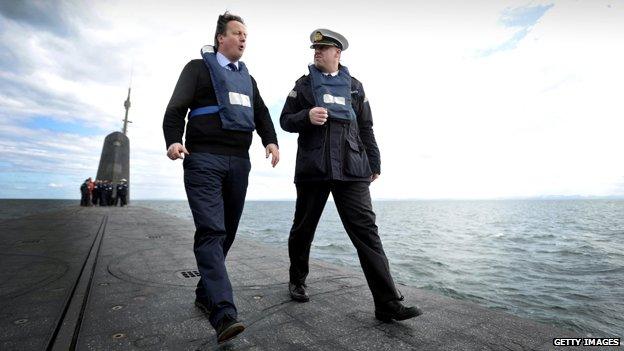
David Cameron with Commander John Livesey aboard HMS Vanguard, 2013
The Scottish government says it is committed to removing Trident if it becomes independent and maintains it would not negotiate with the UK in exchange for concessions on other issues such as national debt and currency union (the UK government has ruled out the latter anyway).
But Ron Smith says there would be considerable pressure within an independent Scotland to do a deal and create a type of Sevastopol military enclave as Ukraine did, before Russia took over the Crimea.
The UK would be under pressure to do a deal too because even if it was feasible to replace the Clyde naval bases - "and it's not clear that it is" - it would be incredibly expensive and time consuming, he says.
But Ritchie thinks the scenario is unlikely. "The SNP has staked its political credibility on getting rid of Trident - it's unlikely to concede. The MoD would also find it very uncomfortable to have the UK's nuclear deterrent in another country, even if it was a sovereign UK territory," he says.
Earlier this year, First Minister Alex Salmond, leader of the SNP, ruled out the prospect of a "Cyprus-style" leaseback scheme. Chalmers says this is a distraction. "A sovereign base area would be UK territory, but a foreign base is different. The SNP has already conceded four years of basing to 2020, so there is no point of principle in extending this for some more years," he says.
Another option would be to change the UK's nuclear deterrent to an airborne or land-based system, according to Williams. However, they have been dismissed as too vulnerable and highly problematic the past.
But Chalmers believes it probably would be possible to find an alternative home for Trident - "given time and political will". But it would not be easy, he says.
Subscribe to the BBC News Magazine's email newsletter to get articles sent to your inbox.